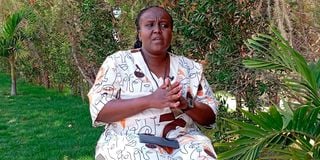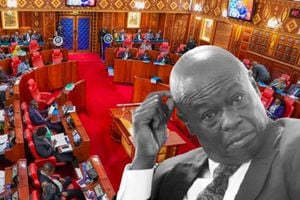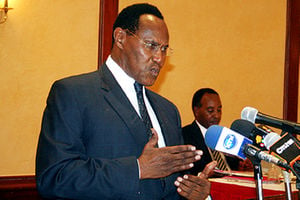The new face of Kajiado politics: Women MCAs take centre stage

Joyce Sunte, nominated MCA at the Kajiado County Assembly speaks during the interview in Kajiado town on September 12, 2024.
What you need to know:
- Women nominated as MCAs in Kajiado County are shattering the "flower girl" stereotype by sponsoring impactful legislation and advocating for marginalised groups.
- Despite the male-dominated assembly, these women leaders, including Betty Taany championing disability rights and Joyce Sunte pushing for corporate social responsibility, are proving their worth through transformative initiatives.
In the sun-baked landscapes of Kajiado County, a quiet revolution is unfolding. Women nominated as Members of County Assembly (MCAs) are shattering stereotypes and proving that they are far more than mere "flower girls" in the political arena. These trailblazers are not content with simply occupying space; they are actively reshaping the political landscape, sponsoring transformative bills, and championing the causes of the marginalised with a fervour that belies their critics' dismissive labels.
In a county assembly dominated by men, where not a single woman has been elected from the 25 wards, these nominated representatives are proving that given the opportunity, women can be formidable agents of change.
Fight for inclusion
Betty Taany's journey to the county assembly is nothing short of inspirational. Struck by polio at the tender age of three, she grew up navigating a world that often overlooked those with disabilities. Today, she stands tall in the Kajiado County Assembly, not just as a voice for women, but as a fierce advocate for people living with disabilities (PWDs).
"The Act calls for the inclusion of PWDs including women and girls," Betty explains, her voice filled with determination as she discusses the Disability Mainstreaming Bill Act she spearheaded. "The budgetary allocations for the welfare of the PWDs have been very minimal. The law, however, allocated Sh50 million to the kitty in the 2023/24 financial year which we believe will be instrumental to uplift their living standards."
This ground-breaking legislation compels the county government to set aside funds for essential equipment, education bursaries, and interest-free loans for PWD groups. It's a law born from personal experience and a deep understanding of the challenges faced by those living with disabilities.
Betty's presence in the assembly is more than symbolic; it's a daily battle against entrenched attitudes.
"At the assembly you have to fight for your space," she reveals. "Male MCAs now respect me as a fighter and women treat me with respect as well."

Betty Taany, a nominated MCA at Kajiado County Assembly speaking during an interview in Kajiado town on September 10, 2024.
While Betty champions disability rights, her colleague Joyce Sunte is taking on the corporate world. Joyce's proposed Corporate Social Responsibility (CSR) Bill is set to revolutionise how companies operate in Kajiado County.
"We need the companies in Kajiado to give back to the society," she asserts, her eyes glimmering with the vision of a more equitable future. "Once enacted, the law will ensure that 70 per cent of people working in the companies here are locals."
The bill, currently at its second reading, is comprehensive in its scope. It calls for companies to implement CSR policies that cover everything from school bursaries and scholarships to environmental protection and healthcare services. Joyce's legislation doesn't just focus on immediate benefits; it looks to the future, mandating youth and sports development programs.
"The bill seeks to have companies compensate farmers whose livestock are affected by their operations that mostly leads to pollution," Joyce elaborates. "It also wants firms to be in the forefront in empowerment through initiatives financing in the community like green houses, beehives, and seedlings."
This forward-thinking approach to CSR could set a new standard for corporate engagement with local communities, not just in Kajiado, but across Kenya.
Unified force for change
The impact of women in the Kajiado County Assembly extends beyond individual achievements. As a collective, they are reshaping the political landscape, one bill at a time.
Joyce, who also serves as the vice-chair of the Education Committee, reveals another initiative close to her heart.
"Women MCAs in the county are very active in the assembly," she says with pride. "They have been in the forefront in lobbying for women inclusion by sponsoring bills or seeking statements touching on gender equality, inclusion and empowerment."
This solidarity has led to significant victories. In 2021, they successfully lobbied for the passing of the Women Economic Empowerment Act, a landmark piece of legislation aimed at economically empowering women in the county.
Janet Sereu, the County Executive Committee Member (CECM) for Gender, Culture, Cooperatives, Tourism and Wildlife, attests to the impact of this fund. "The fund is economically empowering women, and helping them to embrace activities such as modern farming, especially during drought seasons," she notes, highlighting the practical benefits of women-led legislation.
Challenges and the road ahead
Despite these achievements, the path to equality remains steep. Grace Parantai, the chairperson of the Kajiado County Assembly Women Caucus, paints a sobering picture of the current state of affairs.
"Assembly leadership is dominated by men. Many decisions in the assembly favours men, which is why we are keen to change the narrative," Parantai explains. "We need women leadership so that they can help articulate issues touching on women."
The statistics she provides are stark: out of 19 committees, only two are headed by women. It's a reminder that while progress has been made, there's still a long way to go.
The women MCAs are beneficiaries of a UN Women-led initiative aimed at enhancing women's political participation and leadership. The project, "Expanding Spaces for Women Political Participation in Kenya," implemented by Uraia Trust with support from UN Women and funded by Global Affairs Canada (GAC), has been instrumental in building their capacities.
Anna Mutavati, the outgoing UN Women Representative in Kenya, emphasises the critical nature of this work.
"Having women in leadership and governance is critical as there can never be a democracy without the voice of women," she states emphatically.
Janine Cocker, Head of Development Cooperation at the Canadian High Commission in Nairobi, echoes this sentiment. "There has been an increase of women leadership both at the national and county levels which is commendable. Women need to be at the decision making table," she asserts.
Male ally
In a refreshing turn, male colleagues are beginning to recognise and support the contributions of women MCAs. Isaak Ole Kiserian, the minority leader in the Kajiado County Assembly, speaks glowingly of his female counterparts.
"My appeal is for women to believe in themselves since they have what it takes to lead just like men," Kiserian says. "Men are taking the inclusion of women in political participation positively and women need to take advantage of that. In the forthcoming general election, I foresee things being different. We will have more women being elected into office."
His words underscore a growing recognition that women's leadership is not just beneficial for women, but for society as a whole.
"Women form part of the majority and, therefore, it will be unfair to side-line them. To ensure inclusive development, women need to be at the decision making table," he concludes.
As the sun sets over Kajiado County, casting long shadows across its vast plains, the women MCAs continue their work, undeterred by the challenges that lie ahead. They are no longer content to be seen as decorative additions to the political landscape – these women are the gardeners, cultivating a new era of inclusive governance.
As these women MCAs continue to break barriers and challenge stereotypes, they are not just changing the face of Kajiado's politics – they are nurturing the seeds of a more equitable future for all Kenyans.
In the halls of the Kajiado County Assembly, the term "flower girl" has withered away. In its place, a garden of strong, capable leaders has bloomed, their roots deep in the community they serve, their vision reaching towards a horizon of equality and progress.





